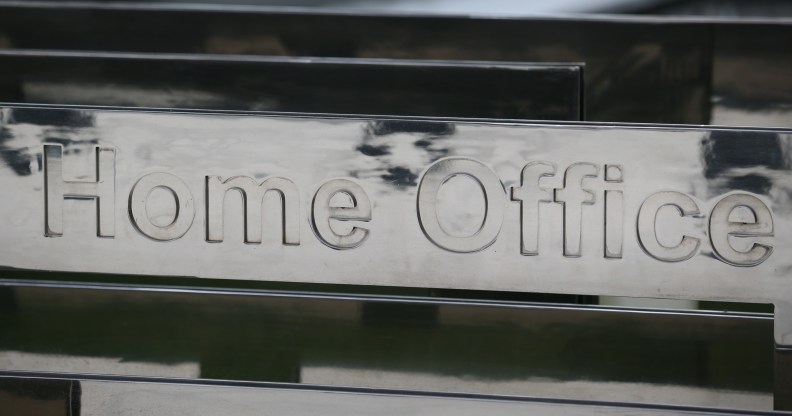The Home Office has refused more than 3,000 asylum seekers from countries where same-sex acts are illegal

LGBT+ rights campaigners complain of a ‘culture of disbelief’ in the Home Office’s treatment of LGBT+ asylum seekers. (Peter Macdiarmid/Getty)
The UK Home Office has refused more than 3,100 asylum claims from LGBT+ nationals where same-sex acts are illegal, damning figures revealed.
The department responsible for immigration has declined countless claims from LGBT+ people between 2016 and 2018, according to an analysis by the Liberal Democrats of figures released by the Home Office.
At least 1,197 LGBT+ Pakistanis were refused asylum bids on the grounds of sexual orientation in the period, The Guardian reported today (2 September).
While a further 640 LGBT+ people from Bangladesh and 389 from Nigeria had their claims refused.
The analysis will prove worrying to many seekers – present and future – considering that many of these countries criminalize queer acts.
In Pakistan, the country’s penal code punishes sodomy. Moreover, punishment can lead up to the death penalty under sharia law, though this has yet to be enforced.
While in Bangledesh, LGBT+ locals encounter severe suppression. Life imprisonment is the maximum sentence for those caught in same-sex acts.
The Human Rights Watch has described discrimination as “pervaive” in the South Asian country.
Furthermore, Nigerian federal law does not recognise queer people. The maximum punishment in the twelve northern states that have adopted Shari’a law is death by stoning.
Marriage equality and adoption have also been outlawed.
Out of the three, Pakistan produces the largest number of asylum claims based on sexual orientation, followed by Bangladesh and Nigeria.
Using data from the International Lesbian, Gay, Bisexual, Trans and Intersex Association, the Liberal Democrats separated out countries where consensual same-sex acts are criminalised.
Within this, it found that the Home Office refused claims from LGBT+ seeking asylum on grounds of sexual orientation from Uganda (145), Ghana (144), Cameroon (136) and Iran (124).
In a statement to PinkNews, a Home Office spokesperson said: “Individuals are only returned to their country of origin when the Home Office and courts deem it is safe to do so.
“Each case is considered on its individual merits against relevant case law and published country information, and all decisions on claims based on sexual orientation are reviewed by an experienced caseworker.
“The UK has a proud record of providing protection to those fleeing persecution.
“Over 12 months we gave protection to more than 18,500 people, the highest number since 2003.”
Calls for review of LGBT+ asylum claims.
LGBT+ rights campaigners have long complained of a “culture of disbelief” in the Home Office’s treatment of LGBT+ asylum seekers, with the analysis only adding fuel to the fire.
Many point towards plummeting rates of people being granted asylum. Between 2017 and 2015, the rate of people granted asylum on the basis of sexual orientation fell from 39 percent to 22 percent.
Others accuse the department of not giving queer seekers fair and equal treatments.
This comes as several cases came to light where gay asylum seekers were rejected on the grounds they are not “effeminate” enough or for not having a gay “demeanor.”
A queer woman who sought asylum in the UK and was deported to Uganda—where gay sex is illegal—has also told how she was persecuted and gang-raped because of her sexuality.
Moreover, the Home Office was criticised for its call to deport a gay man named Kenneth Machari, to Kenya, where same-sex acts are illegal, all while sporting a Pride flag rainbow in its social media logo.
LGBT+ Liberal Democrats: “Their blood is on its hands.”
Jennie Rigg, chair of LGBT+ Liberal Democrats, told PinkNews: “LGBT+LDs have been aware of, and campaigning on, some of the individual cases of judges sending LGBT+ people to countries where they face persecution.
“We are shocked and saddened to hear of the extent of the injustice revealed by these new figures.
“This callous disregard for the safety of LGBT+ asylum seekers shows the Tories’ ‘hostile environment’ intermingled with homophobia, biphobia and transphobia, and dialled up to eleven.
“People fleeing persecution come to a country which they see as a beacon for tolerance of sexual and gender minorities, only to be turned away because of racism, xenophobia, and outdated stereotypes on how sexual and gender minorities live.
“The government must act urgently and stop turning these people away.
“Their blood is on its hands.”

